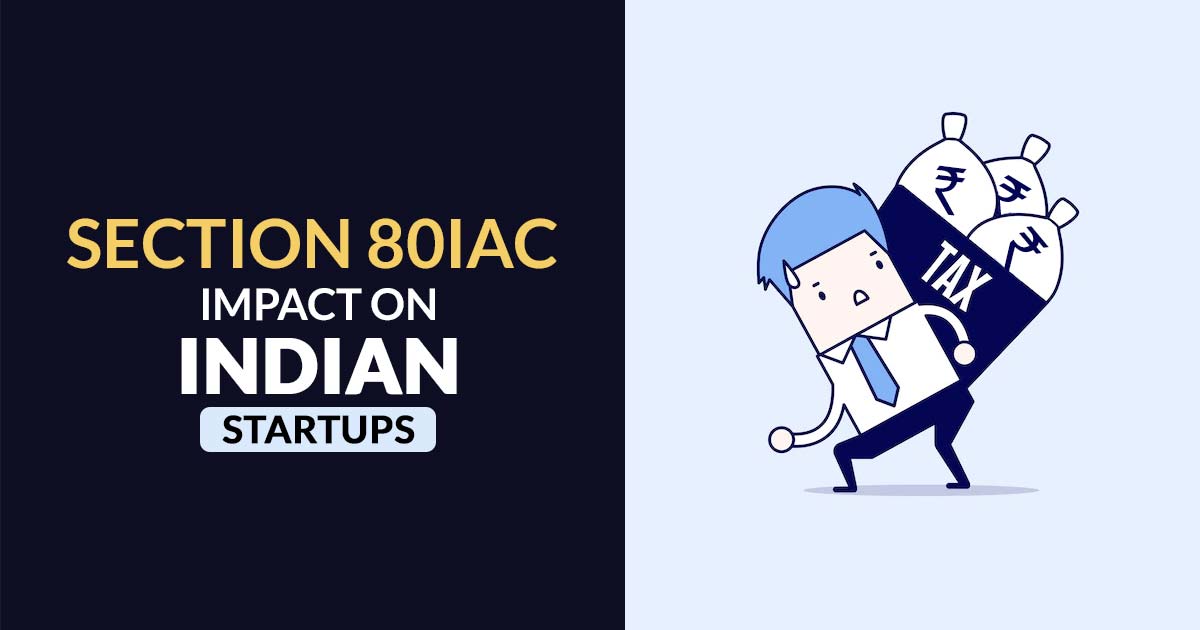
What is IT Section 80IAC?
The Government of India has taken the initiative of Startup India to enhance the startup environment in the country. The major purpose of the same is to make an environment facilitative to the growth and development of startups in India. Section 80IAC of the Income Tax act, it furnishes tax incentives for startups.
Under the benefits, it gives a 100% tax exemption on the incurred profits that the startup made in any three consecutive assessment years out of 10 years beginning from the year in which the eligible startup is incorporated. It is essential for the startup to get registered as a private limited company so as to meet the eligibility criteria for the exemptions from taxes.
Indeed, it is vital for the startup to get engaged in the new product or service development and hold a turnover of less than Rs 100 cr. Section 80IAC of the Income Tax Act has had a significant impact on startups. Tax incentives have boosted the Indian startup ecosystem to a great extent.
It is now possible for startups to invest more money into their operations, allowing them to develop new products and services. The government has also encouraged investors to invest in startups by providing tax incentives. This has led to a rise in venture capital investments in startups, which has provided much-needed capital to them.
Section 80IAC, which was enacted under the Income Tax Act, has generally had a positive effect on startups. In India, it has provided a required boost to the startup ecosystem and would motivate investors to invest in the startups.
100% Deduction Under Section 80-IAC
Section 80-IAC is inserted after section 80-IAB by the Finance Act, 2016, w.e.f. 1-4-2017
“80-IAC. (1) Where the gross total income of an assessee, being an eligible start-up, includes any profits and gains derived from eligible business, there shall, in accordance with and subject to the provisions of this section, be allowed, in computing the total income of the assessee, a deduction of an amount equal to one hundred per cent of the profits and gains derived from such business for three consecutive assessment years.
(2) The deduction specified in sub-section (1) may, at the option of the assessee, be claimed by him for any three consecutive assessment years out of 10 years beginning from the year in which the eligible start-up is incorporated.
(3) This section applies to a start-up which fulfils the following conditions, namely:-
(i) It is not formed by splitting up or the reconstruction of a business already in existence:
Provided that this condition shall not apply in respect of a start-up which is formed as a result of the re-establishment, reconstruction or revival by the assessee of the business of any such undertaking as referred to in section 33B, in the circumstances and within the period specified in that section;
(ii) it is not formed by the transfer to a new business of machinery or plant previously used for any purpose.
(4) The provisions of sub-sections (5) and sub-sections (7) to (11) of section 80-IA shall apply to the start-ups for the purpose of allowing deductions under sub-sections (1).”
Section 80-IAC of the Income Tax Act furnishes a deduction of 100% of the profits and gains via a qualified business of the startup for three successive assessment years out of 10 years. Between April 1, 2016, and March 31, 2030 (Amended by Finance Act, 2023), the businesses that have implemented their operation must secure a turnover of less than Rs 100 cr in the year preceding the assessment year, for which deduction is claimed.
The startups incorporated in India can claim the same deduction. There is a limit on the deduction to claim, i.e. only to an extent of the total income of the business, it could be claimed and not open for the year in which a loss is made.
Clause 3 of the DPIIT Notification on 19th February 2019 stipulated that for claiming advantages of Section 80-IAC of the Income Tax Act, a business should be authenticated as a qualified start-up by the Inter-Ministerial Board of Certification, set up by the Department for Promotion of Industry and Internal Trade (DPIIT).
Certificate Process for Section 80-IAC
To take the certificate for Section 80-IAC of the Act, one needs to create an application in the mentioned Form-1, including the documents mentioned in it to the inter-Ministerial Board of Certification, and the council might post asking for these documents or data and conduct inquiries, as they may find suitable:
(i) allotted the certificate related to in sub-clause (c) of clause (ii) of the Explanation to Section 80-IAC of the Income Tax Act; or
(ii) Cancel the application by giving reasons.
Revocation Process
It is warned by the DPIIT Notification in Clause 8, in the case when it revealed that any certification directed to Clause 3 as complies with Section 80-IAC of the Income Tax Act, 1961 has been taken through the incorrect details, or by suppressing any material fact, no advantages of the prescribed notification are to be provided and the certified entity will be responsible to be proceeded against under the provisions of the Income Tax Act, 1961.
Closure
The implementation of Section 80IAC of the Income Tax Act would prove to be effective for startups in India. The tax load has been eliminated by the act, and hence, enhanced profits have been seen among startups. More profits would be enabled to be retained by the act and reinvested in the business.
Much more enhancement among startups is being driven by the provision, which has enabled them to become more competitive in the market. Capital support, as needed, is provided through the investors so as to make them rise and expand. Section 80IAC of the Income Tax Act proved to be the catalyst for the startup’s growth and development in India.










if A company has wrongly claimed benefit under 80-IAC for 3 years. Is it possible to correct?